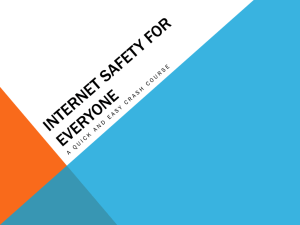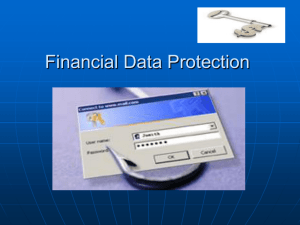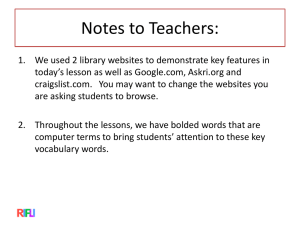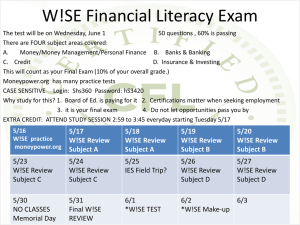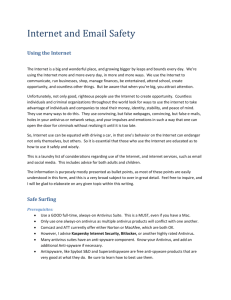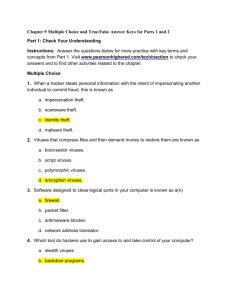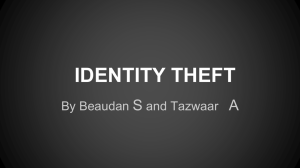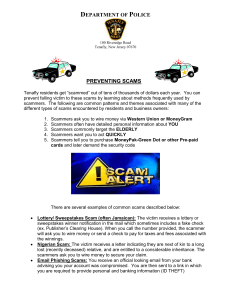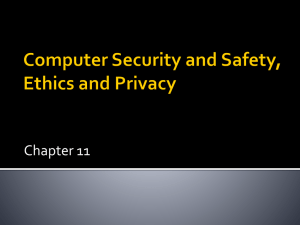Internet Safety
advertisement
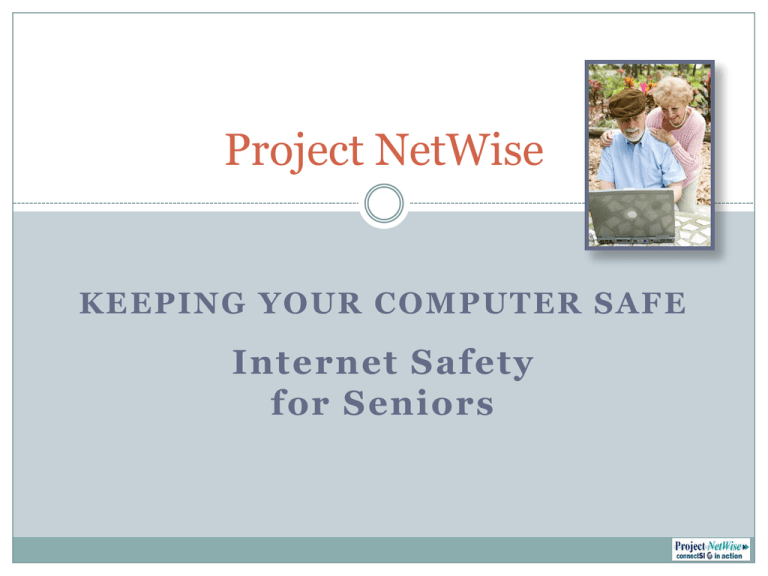
Project NetWise KEEPING YOUR COMPUTER SAFE Internet Safety for Seniors Overview Computer Protection Medical Records Online Identity Theft Socializing On Line Communicating Online Safe Practices Spending & Saving Online Computing on the Go Bullying On Line Buying Prescriptions Online Computer Protection Key Terms: Firewall – Blocks outside access to a computer Antivirus – Prevents most destructive programs (viruses) from accessing a computer Cookies – Stores and transmits information to parent websites Passwords – Allows access to online accounts Computer Protection Online: Internet Connected to the Internet Disconnect when not in use Firewall: Limits the information sent to and from your computer Barrier from the internet Examples of firewall programs: Zonealarm Comodo Norton Your Computer Computer Protection Antivirus Protection: Prevents viruses from effecting your computer Can only prevent what it recognizes Important to keep software updated Examples of antivirus programs: McAfee Norton AVG Anti-virus Computer Protection Cookies Allow companies to store information on your machine Collect information on your use Sell information gathered to 3rd parties Create profiles based on information gathered Set computer to accept different level of cookies I’ve been to this site! Computer Protection Keep Your Password Safe! Passwords are keys to personal information Increase password security by using: Capital letters, lowercase letters, symbols, and numbers Abbreviations not whole words Example: s0uth*ern ILL-in0is Change your password frequently NOTE: These precautions will not protect your computer 100% Identity Theft Key Terms: Email – Messages sent via the internet Websites – Locations on the internet Identity Theft Scamming: Tricking or deceiving a person or group of people to obtain information Phishing Email A common avenue for virtual scam artist. False email can appear obvious or subtle. Phishing Website Another common venue for virtual scam artist. Attempt to gather personal information Email Scam: Clear Example Email Scam: Subtle Example Southern Illinois Bank Email Follow these guidelines when using email: Sent messages are uncontrollable. Do not open emails from email addresses you do not recognize! Treat online situations the same way you would personal situations. Identity Theft: Websites Check out the legitimacy of a website o Key icons and web addresses Well-known site Check for misspellings Do not give out personal information Set information to private if possible If you are unsure just remember to: Stop… Look… Call! Communicating Online Information you may want to consider before sharing with others online: Your name and the names of family members and friends Age and gender of yourself, your children, or grandchildren E-mail addresses, user IDs, nicknames, and domain names Address Locations of others close to you Phone numbers Passwords Personal numbers Photos Information about others Spending And Saving Online Consider the following before buying anything online: Do you know the store from the brick mortar world? What is the site’s reputation? Is the website secure? Is the offer too good to be true? Does the merchant collect more information than is needed to complete the sale? Use a payment service or credit card for payment. Review the company's shipping method. Spending and Saving Online Protect yourself when banking or paying bills online: Make sure your computer has up-to-date versions of anti-virus and anti-spyware and install all updates. Check that your new bank is legitimate and your deposits are insured. Never conduct personal transactions from a public computer. Keep all personal information secure. Create strong passwords. Be alert to e-mail scams. Ensure that you are dealing with your bank. Always type in your bank’s URL yourself. Monitor your account activity by requesting online credit reports . Computing On The Go Using public computers safely Using mobile phones Bullying On Line What to do if you are “cyber-bullied.” Safety tips to avoid or deal with online bullying. Keep personal information private. Use technology tools to block inappropriate or threatening behavior. Do not answer phone calls or read messages, e-mails or comments from “cyber-bullies.” Set them aside in case they are needed by authorities for evidence. Buying Prescriptions On Line Know your source to make sure it’s safe Make sure a website is a state-licensed pharmacy located in the United States. Find a list at http://www.nabp.net and http://www.vipps.info. Look for websites with practices that protect you. Be sure your privacy is protected. If you are suspicious or have complaints about a service or transaction, report the website! Electronic Medical Records The advantages of Electronic Medical Records Recommended online storage services for Electronic Medical Records. Socializing Online Online Dating Blogging Social Networking Chat discussion boards and forums Online quizzes and surveys Sharing Photos, Images & Video Sharing Photos Safely Image copyright infringement Sharing videos online Using webcams Defensive Computing Browsing and searching Ads on search engines and sponsored search results. Identifying secure/trusted websites Understand the risks in sharing information. Browser settings and filtering software. Safe Practices Remember these helpful tips when using a computer for “web surfing” or online transactions: Treat your computer like your home. Never give out personal information! Talk to your kids about Internet safety. If it sounds too good to be true… it usually is! Remember: The Benefits Out Weigh The Risks The Internet can be a valuable resource for you and your family: http://www.siuc.edu http://www.netsmartzkids.org http://www.thinkfinity.org http://www.accesssi.org http://www.jalc.edu http://www.shawneetourism.com http://www.illinoisworknet.com http://www.connectsi.us.com
